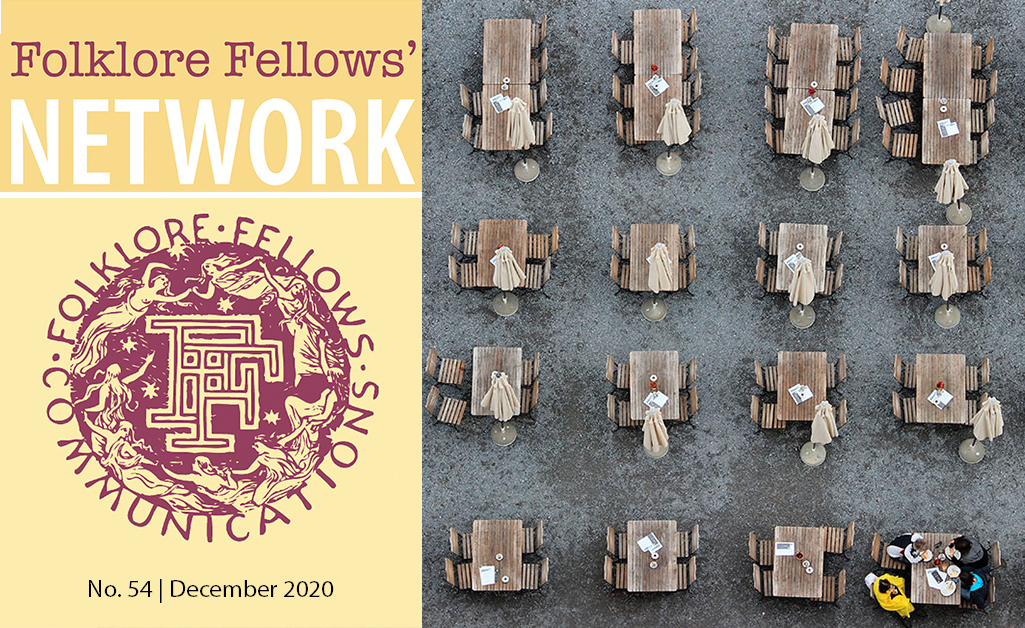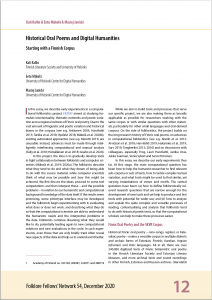Starting with a Finnish Corpus
Kati Kallio
Finnish Literature Society and University of Helsinki
Eetu Mäkelä
University of Helsinki Centre for Digital Humanities
Maciej Janicki
University of Helsinki Centre for Digital Humanities
In this essay, we describe early experiments in a computational folkloristics project FILTER aimed at studying formulaic intertextuality, thematic networks and poetic variation across regional cultures of Finnic oral poetry. Due to the vast amount of linguistic and poetic variation and historical biases in the corpora (see e.g. Anttonen 2005; Harvilahti 2013; Tarkka et al. 2018; Ilyefalvi 2018; Mäkelä et al. 2020b), existing automated approaches (see e.g. Moretti 2013) are unusable. Instead, advances must be made through intelligently interleaving computational and manual analysis (Säily et al. 2018; Hämäläinen et al. 2018; Isoaho et al. 2020).
In this project, the idea is to gradually develop tools in tight collaboration between folklorists and computer scientists (Mäkelä et al. 2019; 2020a). The folklorists describe what they tend to do and what they dream of being able to do with the source material, while computer scientists think of what may be possible and how this might be achieved. We first discuss the ideas, proceed to some test computations and then interpret these – and the possible problems – in relation to our humanistic and computational background knowledge of the data itself. If the results seem promising, some prototype interface may be developed, and the folklorists begin experimenting with it, evaluating what does or does not work, and describing what they do so that the computational scientists are able to understand the humanistic needs and the interpretive problems in the data. Folklorists continue dreaming what they would like to do, potentially leading again to new computational solutions and new evaluations in the cycle. In such experiments, even those that are only briefly tried often reveal new aspects of the data and help us to understand it better.
While we aim to build tools and processes that serve our specific project, we are also making them as broadly applicable as possible for researchers working with the same corpus or with similar questions with other materials, particularly for other small languages and oral-derived corpora. On the side of folkloristics, the project builds on the long research history of Finnic oral poems, on advances in computational folkloristics (see e.g. Abello et al. 2012; Arvidson et al. 2018; Harvilahti 2019; Hakamies et al. 2019; Sarv 2019; Tangherlini 2013; 2016) and on discussions with colleagues, especially Frog, Lauri Harvilahti, Janika Oras, Jukka Saarinen, Venla Sykäri and Senni Timonen.
In this essay, we describe our early experiments thus far. At this stage, the main computational question has been how to help the humanist researcher to find relevant sub-corpora or sets of texts, how to tackle complex textual variation, and what tools might be used to find similar, yet varying instantiations of verses and motifs. The central questions have been: (a) how to define folkloristically relevant research questions that are narrow enough for the development of new tools and yet help to produce and test tools with potential for wider use; and (b) how to analyse and explain the quite complex and versatile processes of reading, contextualising and analysis that folklorists tend to do with historical poetic texts, so that the computational scholars can help to make these processes easier.

